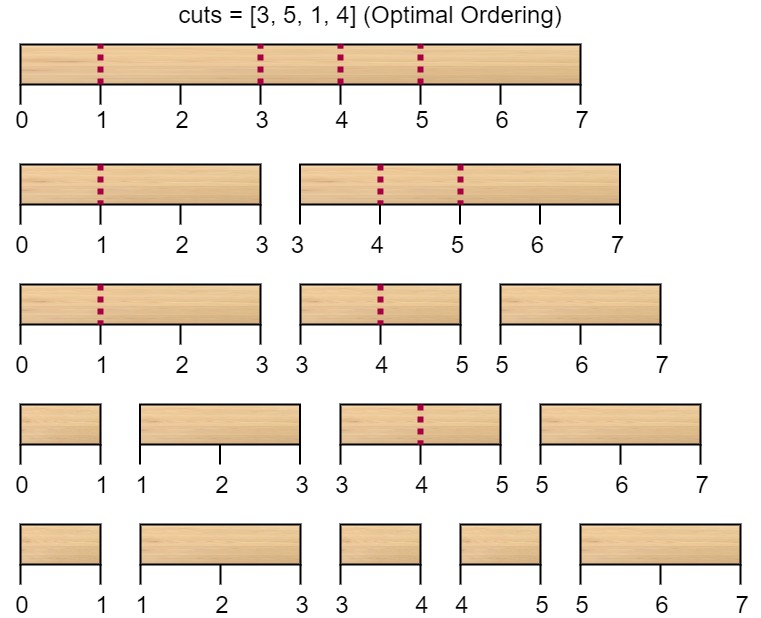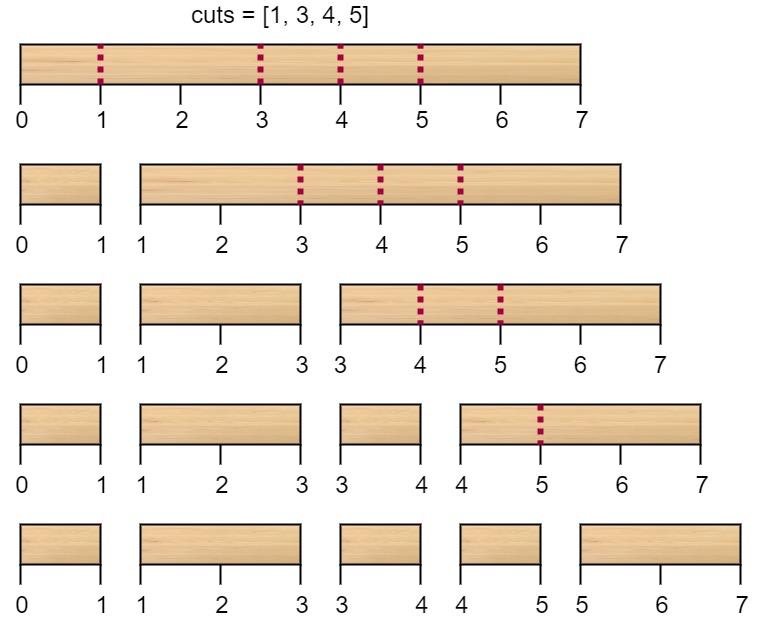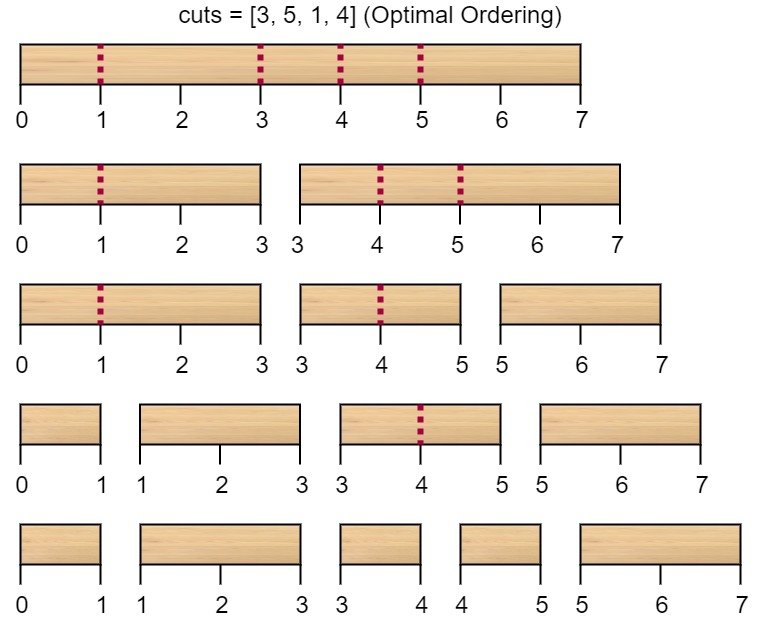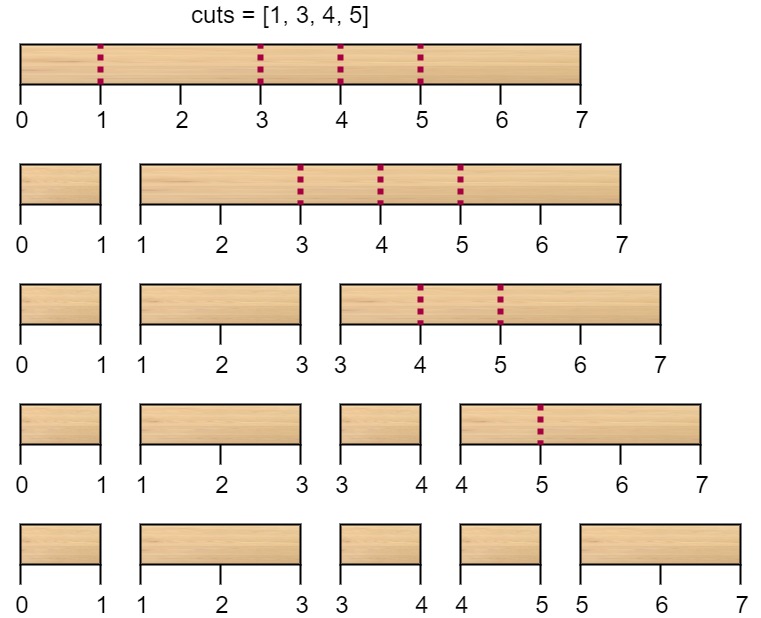weekly-contest-201
A
Statement
Metadata
- Link: 整理字符串
- Difficulty: Easy
- Tag:
栈字符串
给你一个由大小写英文字母组成的字符串 s 。
一个整理好的字符串中,两个相邻字符 s[i] 和 s[i+1],其中 0<= i <= s.length-2 ,要满足如下条件:
- 若
s[i]是小写字符,则s[i+1]不可以是相同的大写字符。 - 若
s[i]是大写字符,则s[i+1]不可以是相同的小写字符。
请你将字符串整理好,每次你都可以从字符串中选出满足上述条件的 两个相邻 字符并删除,直到字符串整理好为止。
请返回整理好的 字符串 。题目保证在给出的约束条件下,测试样例对应的答案是唯一的。
注意:空字符串也属于整理好的字符串,尽管其中没有任何字符。
示例 1:
输入:s = "leEeetcode"
输出:"leetcode"
解释:无论你第一次选的是 i = 1 还是 i = 2,都会使 "leEeetcode" 缩减为 "leetcode" 。
示例 2:
输入:s = "abBAcC"
输出:""
解释:存在多种不同情况,但所有的情况都会导致相同的结果。例如:
"abBAcC" → "aAcC" → "cC" → ""
"abBAcC" → "abBA" → "aA" → ""
示例 3:
输入:s = "s"
输出:"s"
提示:
1 <= s.length <= 100s只包含小写和大写英文字母
Metadata
- Link: Make The String Great
- Difficulty: Easy
- Tag:
StackString
Given a string s of lower and upper case English letters.
A good string is a string which doesn't have two adjacent characters s[i] and s[i + 1] where:
0 <= i <= s.length - 2s[i]is a lower-case letter ands[i + 1]is the same letter but in upper-case or vice-versa.
To make the string good, you can choose two adjacent characters that make the string bad and remove them. You can keep doing this until the string becomes good.
Return the string after making it good. The answer is guaranteed to be unique under the given constraints.
Notice that an empty string is also good.
Example 1:
Input: s = "leEeetcode"
Output: "leetcode"
Explanation: In the first step, either you choose i = 1 or i = 2, both will result "leEeetcode" to be reduced to "leetcode".
Example 2:
Input: s = "abBAcC"
Output: ""
Explanation: We have many possible scenarios, and all lead to the same answer. For example:
"abBAcC" –> "aAcC" –> "cC" –> ""
"abBAcC" –> "abBA" –> "aA" –> ""
Example 3:
Input: s = "s"
Output: "s"
Constraints:
1 <= s.length <= 100scontains only lower and upper case English letters.
Solution
#include <bits/stdc++.h>
using namespace std;
#define endl "\n"
#define fi first
#define se second
#define SZ(x) ((int)(x).size())
#define mkp make_pair
#define all(x) (x).begin(), (x).end()
using db = double;
using ll = long long;
using ull = unsigned long long;
using pII = pair<int, int>;
using pLL = pair<ll, ll>;
constexpr int mod = 1e9 + 7;
template <class T1, class T2>
inline void chadd(T1 &x, T2 y, int Mod = mod) {
x += y;
while (x >= Mod) x -= Mod;
while (x < 0) x += Mod;
}
template <class T1, class T2>
inline void chmax(T1 &x, T2 y) {
if (x < y)
x = y;
}
template <class T1, class T2>
inline void chmin(T1 &x, T2 y) {
if (x > y)
x = y;
}
inline int nextInt() {
int x;
cin >> x;
return x;
}
void rd() {}
template <class T, class... Ts>
void rd(T &arg, Ts &...args) {
cin >> arg;
rd(args...);
}
#define dbg(x...) \
do { \
cout << "\033[32;1m" << #x << " -> "; \
err(x); \
} while (0)
void err() {
cout << "\033[39;0m" << endl;
}
template <class T, class... Ts>
void err(const T &arg, const Ts &...args) {
cout << arg << ' ';
err(args...);
}
template <template <typename...> class T, typename t, typename... A>
void err(const T<t> &arg, const A &...args) {
for (auto &v : arg) cout << v << ' ';
err(args...);
}
void ptt() {
cout << endl;
}
template <class T, class... Ts>
void ptt(const T &arg, const Ts &...args) {
cout << ' ' << arg;
ptt(args...);
}
template <class T, class... Ts>
void pt(const T &arg, const Ts &...args) {
cout << arg;
ptt(args...);
}
void pt() {}
template <template <typename...> class T, typename t, typename... A>
void pt(const T<t> &arg, const A &...args) {
for (int i = 0, sze = arg.size(); i < sze; ++i) cout << arg[i] << " \n"[i == sze - 1];
pt(args...);
}
inline ll qpow(ll base, ll n) {
assert(n >= 0);
ll res = 1;
while (n) {
if (n & 1)
res = res * base % mod;
base = base * base % mod;
n >>= 1;
}
return res;
}
// head
constexpr int N = 1e5 + 10;
char sta[N];
int top;
class Solution {
public:
string makeGood(string s) {
top = 0;
for (auto &ch : s) {
sta[++top] = ch;
while (top >= 2 && (sta[top] - 'A' == sta[top - 1] - 'a' || sta[top] - 'a' == sta[top - 1] - 'A')) {
top -= 2;
}
}
string res = "";
for (int i = 1; i <= top; ++i) res += sta[i];
return res;
}
};
#ifdef LOCAL
int main() {
return 0;
}
#endif
B
Statement
Metadata
- Link: 找出第 N 个二进制字符串中的第 K 位
- Difficulty: Medium
- Tag:
递归字符串
给你两个正整数 n 和 k,二进制字符串 Sn 的形成规则如下:
S1 = "0"- 当
i > 1时,Si = Si-1 + "1" + reverse(invert(Si-1))
其中 + 表示串联操作,reverse(x) 返回反转 x 后得到的字符串,而 invert(x) 则会翻转 x 中的每一位(0 变为 1,而 1 变为 0)。
例如,符合上述描述的序列的前 4 个字符串依次是:
S1 = "0"S2 = "011"S3 = "0111001"S4 = "011100110110001"
请你返回 Sn 的 第 k 位字符 ,题目数据保证 k 一定在 Sn 长度范围以内。
示例 1:
输入:n = 3, k = 1
输出:"0"
解释:S3 为 "0111001",其第 1 位为 "0" 。
示例 2:
输入:n = 4, k = 11
输出:"1"
解释:S4 为 "011100110110001",其第 11 位为 "1" 。
示例 3:
输入:n = 1, k = 1
输出:"0"
示例 4:
输入:n = 2, k = 3
输出:"1"
提示:
1 <= n <= 201 <= k <= 2n - 1
Metadata
- Link: Find Kth Bit in Nth Binary String
- Difficulty: Medium
- Tag:
RecursionString
Given two positive integers n and k, the binary string Sn is formed as follows:
S1 = "0"Si = Si - 1 + "1" + reverse(invert(Si - 1))fori > 1
Where + denotes the concatenation operation, reverse(x) returns the reversed string x, and invert(x) inverts all the bits in x (0 changes to 1 and 1 changes to 0).
For example, the first four strings in the above sequence are:
S1 = "0"S2 = "011"S3 = "0111001"S4 = "011100110110001"
Return the kth bit in Sn. It is guaranteed that k is valid for the given n.
Example 1:
Input: n = 3, k = 1
Output: "0"
Explanation: S3 is "0111001".
The 1st bit is "0".
Example 2:
Input: n = 4, k = 11
Output: "1"
Explanation: S4 is "011100110110001".
The 11th bit is "1".
Constraints:
1 <= n <= 201 <= k <= 2n - 1
Solution
#include <bits/stdc++.h>
using namespace std;
#define endl "\n"
#define fi first
#define se second
#define SZ(x) ((int)(x).size())
#define mkp make_pair
#define all(x) (x).begin(), (x).end()
using db = double;
using ll = long long;
using ull = unsigned long long;
using pII = pair<int, int>;
using pLL = pair<ll, ll>;
constexpr int mod = 1e9 + 7;
template <class T1, class T2>
inline void chadd(T1 &x, T2 y, int Mod = mod) {
x += y;
while (x >= Mod) x -= Mod;
while (x < 0) x += Mod;
}
template <class T1, class T2>
inline void chmax(T1 &x, T2 y) {
if (x < y)
x = y;
}
template <class T1, class T2>
inline void chmin(T1 &x, T2 y) {
if (x > y)
x = y;
}
inline int nextInt() {
int x;
cin >> x;
return x;
}
void rd() {}
template <class T, class... Ts>
void rd(T &arg, Ts &...args) {
cin >> arg;
rd(args...);
}
#define dbg(x...) \
do { \
cout << "\033[32;1m" << #x << " -> "; \
err(x); \
} while (0)
void err() {
cout << "\033[39;0m" << endl;
}
template <class T, class... Ts>
void err(const T &arg, const Ts &...args) {
cout << arg << ' ';
err(args...);
}
template <template <typename...> class T, typename t, typename... A>
void err(const T<t> &arg, const A &...args) {
for (auto &v : arg) cout << v << ' ';
err(args...);
}
void ptt() {
cout << endl;
}
template <class T, class... Ts>
void ptt(const T &arg, const Ts &...args) {
cout << ' ' << arg;
ptt(args...);
}
template <class T, class... Ts>
void pt(const T &arg, const Ts &...args) {
cout << arg;
ptt(args...);
}
void pt() {}
template <template <typename...> class T, typename t, typename... A>
void pt(const T<t> &arg, const A &...args) {
for (int i = 0, sze = arg.size(); i < sze; ++i) cout << arg[i] << " \n"[i == sze - 1];
pt(args...);
}
inline ll qpow(ll base, ll n) {
assert(n >= 0);
ll res = 1;
while (n) {
if (n & 1)
res = res * base % mod;
base = base * base % mod;
n >>= 1;
}
return res;
}
// head
constexpr int N = 1e5 + 10;
// int n;
string Invert(string &s) {
string res = "";
for (auto &ch : s) {
res += ((ch - '0') ^ 1) + '0';
}
return res;
}
class Solution {
public:
char findKthBit(int n, int k) {
string s = "0";
for (int i = 2; i <= n; ++i) {
string t = "";
t = s;
t += "1";
string tmp = Invert(s);
reverse(all(tmp));
t += tmp;
// t += reverse(all(Invert(s)));
s = t;
}
return s[k - 1];
}
};
#ifdef LOCAL
int main() {
return 0;
}
#endif
C
Statement
Metadata
- Link: 和为目标值且不重叠的非空子数组的最大数目
- Difficulty: Medium
- Tag:
贪心数组哈希表前缀和
给你一个数组 nums 和一个整数 target 。
请你返回 非空不重叠 子数组的最大数目,且每个子数组中数字和都为 target 。
示例 1:
输入:nums = [1,1,1,1,1], target = 2
输出:2
解释:总共有 2 个不重叠子数组(加粗数字表示) [1,1,1,1,1] ,它们的和为目标值 2 。
示例 2:
输入:nums = [-1,3,5,1,4,2,-9], target = 6
输出:2
解释:总共有 3 个子数组和为 6 。
([5,1], [4,2], [3,5,1,4,2,-9]) 但只有前 2 个是不重叠的。示例 3:
输入:nums = [-2,6,6,3,5,4,1,2,8], target = 10
输出:3
示例 4:
输入:nums = [0,0,0], target = 0
输出:3
提示:
1 <= nums.length <= 10^5-10^4 <= nums[i] <= 10^40 <= target <= 10^6
Metadata
- Link: Maximum Number of Non-Overlapping Subarrays With Sum Equals Target
- Difficulty: Medium
- Tag:
GreedyArrayHash TablePrefix Sum
Given an array nums and an integer target, return the maximum number of non-empty non-overlapping subarrays such that the sum of values in each subarray is equal to target.
Example 1:
Input: nums = [1,1,1,1,1], target = 2
Output: 2
Explanation: There are 2 non-overlapping subarrays [1,1,1,1,1] with sum equals to target(2).
Example 2:
Input: nums = [-1,3,5,1,4,2,-9], target = 6
Output: 2
Explanation: There are 3 subarrays with sum equal to 6.
([5,1], [4,2], [3,5,1,4,2,-9]) but only the first 2 are non-overlapping.
Constraints:
1 <= nums.length <= 105-104 <= nums[i] <= 1040 <= target <= 106
Solution
#include <bits/stdc++.h>
using namespace std;
#define endl "\n"
#define fi first
#define se second
#define SZ(x) ((int)(x).size())
#define mkp make_pair
#define all(x) (x).begin(), (x).end()
using db = double;
using ll = long long;
using ull = unsigned long long;
using pII = pair<int, int>;
using pLL = pair<ll, ll>;
constexpr int mod = 1e9 + 7;
template <class T1, class T2>
inline void chadd(T1 &x, T2 y, int Mod = mod) {
x += y;
while (x >= Mod) x -= Mod;
while (x < 0) x += Mod;
}
template <class T1, class T2>
inline void chmax(T1 &x, T2 y) {
if (x < y)
x = y;
}
template <class T1, class T2>
inline void chmin(T1 &x, T2 y) {
if (x > y)
x = y;
}
inline int nextInt() {
int x;
cin >> x;
return x;
}
void rd() {}
template <class T, class... Ts>
void rd(T &arg, Ts &...args) {
cin >> arg;
rd(args...);
}
#define dbg(x...) \
do { \
cout << "\033[32;1m" << #x << " -> "; \
err(x); \
} while (0)
void err() {
cout << "\033[39;0m" << endl;
}
template <class T, class... Ts>
void err(const T &arg, const Ts &...args) {
cout << arg << ' ';
err(args...);
}
template <template <typename...> class T, typename t, typename... A>
void err(const T<t> &arg, const A &...args) {
for (auto &v : arg) cout << v << ' ';
err(args...);
}
void ptt() {
cout << endl;
}
template <class T, class... Ts>
void ptt(const T &arg, const Ts &...args) {
cout << ' ' << arg;
ptt(args...);
}
template <class T, class... Ts>
void pt(const T &arg, const Ts &...args) {
cout << arg;
ptt(args...);
}
void pt() {}
template <template <typename...> class T, typename t, typename... A>
void pt(const T<t> &arg, const A &...args) {
for (int i = 0, sze = arg.size(); i < sze; ++i) cout << arg[i] << " \n"[i == sze - 1];
pt(args...);
}
inline ll qpow(ll base, ll n) {
assert(n >= 0);
ll res = 1;
while (n) {
if (n & 1)
res = res * base % mod;
base = base * base % mod;
n >>= 1;
}
return res;
}
// head
constexpr int N = 1e5 + 10;
int f[N];
map<int, int> g;
class Solution {
public:
int maxNonOverlapping(vector<int> &nums, int target) {
g.clear();
int n = SZ(nums);
g[0] = 0;
int Max = 0;
for (int i = 0; i < n; ++i) {
f[i + 1] = f[i] + nums[i];
int dif = f[i + 1] - target;
int now = 0;
if (g.count(dif)) {
now += g[dif] + 1;
}
chmax(Max, now);
g[f[i + 1]] = Max;
// max({Max, g[f[i + 1]], now});
}
int res = 0;
for (auto &it : g) {
chmax(res, it.se);
}
return res;
}
};
#ifdef LOCAL
int main() {
return 0;
}
#endif
D
Statement
Metadata
- Link: 切棍子的最小成本
- Difficulty: Hard
- Tag:
数组动态规划
有一根长度为 n 个单位的木棍,棍上从 0 到 n 标记了若干位置。例如,长度为 6 的棍子可以标记如下:

给你一个整数数组 cuts ,其中 cuts[i] 表示你需要将棍子切开的位置。
你可以按顺序完成切割,也可以根据需要更改切割的顺序。
每次切割的成本都是当前要切割的棍子的长度,切棍子的总成本是历次切割成本的总和。对棍子进行切割将会把一根木棍分成两根较小的木棍(这两根木棍的长度和就是切割前木棍的长度)。请参阅第一个示例以获得更直观的解释。
返回切棍子的 最小总成本 。
示例 1:

输入:n = 7, cuts = [1,3,4,5]
输出:16
解释:按 [1, 3, 4, 5] 的顺序切割的情况如下所示:
 第一次切割长度为 7 的棍子,成本为 7 。第二次切割长度为 6 的棍子(即第一次切割得到的第二根棍子),第三次切割为长度 4 的棍子,最后切割长度为 3 的棍子。总成本为 7 + 6 + 4 + 3 = 20 。
而将切割顺序重新排列为 [3, 5, 1, 4] 后,总成本 = 16(如示例图中 7 + 4 + 3 + 2 = 16)。
第一次切割长度为 7 的棍子,成本为 7 。第二次切割长度为 6 的棍子(即第一次切割得到的第二根棍子),第三次切割为长度 4 的棍子,最后切割长度为 3 的棍子。总成本为 7 + 6 + 4 + 3 = 20 。
而将切割顺序重新排列为 [3, 5, 1, 4] 后,总成本 = 16(如示例图中 7 + 4 + 3 + 2 = 16)。
示例 2:
输入:n = 9, cuts = [5,6,1,4,2]
输出:22
解释:如果按给定的顺序切割,则总成本为 25 。总成本 <= 25 的切割顺序很多,例如,[4, 6, 5, 2, 1] 的总成本 = 22,是所有可能方案中成本最小的。
提示:
2 <= n <= 10^61 <= cuts.length <= min(n - 1, 100)1 <= cuts[i] <= n - 1cuts数组中的所有整数都 互不相同
Metadata
- Link: Minimum Cost to Cut a Stick
- Difficulty: Hard
- Tag:
ArrayDynamic Programming
Given a wooden stick of length n units. The stick is labelled from 0 to n. For example, a stick of length 6 is labelled as follows:

Given an integer array cuts where cuts[i] denotes a position you should perform a cut at.
You should perform the cuts in order, you can change the order of the cuts as you wish.
The cost of one cut is the length of the stick to be cut, the total cost is the sum of costs of all cuts. When you cut a stick, it will be split into two smaller sticks (i.e. the sum of their lengths is the length of the stick before the cut). Please refer to the first example for a better explanation.
Return the minimum total cost of the cuts.
Example 1:

Input: n = 7, cuts = [1,3,4,5]
Output: 16
Explanation: Using cuts order = [1, 3, 4, 5] as in the input leads to the following scenario:
 The first cut is done to a rod of length 7 so the cost is 7. The second cut is done to a rod of length 6 (i.e. the second part of the first cut), the third is done to a rod of length 4 and the last cut is to a rod of length 3. The total cost is 7 + 6 + 4 + 3 = 20.
Rearranging the cuts to be [3, 5, 1, 4] for example will lead to a scenario with total cost = 16 (as shown in the example photo 7 + 4 + 3 + 2 = 16).
The first cut is done to a rod of length 7 so the cost is 7. The second cut is done to a rod of length 6 (i.e. the second part of the first cut), the third is done to a rod of length 4 and the last cut is to a rod of length 3. The total cost is 7 + 6 + 4 + 3 = 20.
Rearranging the cuts to be [3, 5, 1, 4] for example will lead to a scenario with total cost = 16 (as shown in the example photo 7 + 4 + 3 + 2 = 16).Example 2:
Input: n = 9, cuts = [5,6,1,4,2]
Output: 22
Explanation: If you try the given cuts ordering the cost will be 25.
There are much ordering with total cost <= 25, for example, the order [4, 6, 5, 2, 1] has total cost = 22 which is the minimum possible.
Constraints:
2 <= n <= 1061 <= cuts.length <= min(n - 1, 100)1 <= cuts[i] <= n - 1- All the integers in
cutsarray are distinct.
Solution
#include <bits/stdc++.h>
using namespace std;
#define endl "\n"
#define fi first
#define se second
#define SZ(x) ((int)(x).size())
#define mkp make_pair
#define all(x) (x).begin(), (x).end()
using db = double;
using ll = long long;
using ull = unsigned long long;
using pII = pair<int, int>;
using pLL = pair<ll, ll>;
constexpr int mod = 1e9 + 7;
template <class T1, class T2>
inline void chadd(T1 &x, T2 y, int Mod = mod) {
x += y;
while (x >= Mod) x -= Mod;
while (x < 0) x += Mod;
}
template <class T1, class T2>
inline void chmax(T1 &x, T2 y) {
if (x < y)
x = y;
}
template <class T1, class T2>
inline void chmin(T1 &x, T2 y) {
if (x > y)
x = y;
}
inline int nextInt() {
int x;
cin >> x;
return x;
}
void rd() {}
template <class T, class... Ts>
void rd(T &arg, Ts &...args) {
cin >> arg;
rd(args...);
}
#define dbg(x...) \
do { \
cout << "\033[32;1m" << #x << " -> "; \
err(x); \
} while (0)
void err() {
cout << "\033[39;0m" << endl;
}
template <class T, class... Ts>
void err(const T &arg, const Ts &...args) {
cout << arg << ' ';
err(args...);
}
template <template <typename...> class T, typename t, typename... A>
void err(const T<t> &arg, const A &...args) {
for (auto &v : arg) cout << v << ' ';
err(args...);
}
void ptt() {
cout << endl;
}
template <class T, class... Ts>
void ptt(const T &arg, const Ts &...args) {
cout << ' ' << arg;
ptt(args...);
}
template <class T, class... Ts>
void pt(const T &arg, const Ts &...args) {
cout << arg;
ptt(args...);
}
void pt() {}
template <template <typename...> class T, typename t, typename... A>
void pt(const T<t> &arg, const A &...args) {
for (int i = 0, sze = arg.size(); i < sze; ++i) cout << arg[i] << " \n"[i == sze - 1];
pt(args...);
}
inline ll qpow(ll base, ll n) {
assert(n >= 0);
ll res = 1;
while (n) {
if (n & 1)
res = res * base % mod;
base = base * base % mod;
n >>= 1;
}
return res;
}
// head
constexpr int N = 1e3 + 10;
constexpr ll INFLL = 0x3f3f3f3f3f3f3f3f;
int n, m, a[N];
ll f[N][N];
ll dfs(int l, int r) {
if (f[l][r] != -1)
return f[l][r];
if (l >= r)
return 0ll;
if (l + 1 == r)
return f[l][r] = a[l] + a[r];
ll res = INFLL;
ll tot = 0;
for (int i = l; i <= r; ++i) {
if (i < r)
chmin(res, dfs(l, i) + dfs(i + 1, r));
tot += a[i];
}
return f[l][r] = res + tot;
}
class Solution {
public:
int minCost(int _n, vector<int> &cuts) {
n = _n;
// m = SZ(cuts);
memset(f, -1, sizeof f);
int pre = 0;
m = 0;
sort(all(cuts));
for (auto &it : cuts) {
a[++m] = it - pre;
pre = it;
}
a[++m] = n - pre;
return dfs(1, m);
}
};
#ifdef LOCAL
int main() {
return 0;
}
#endif